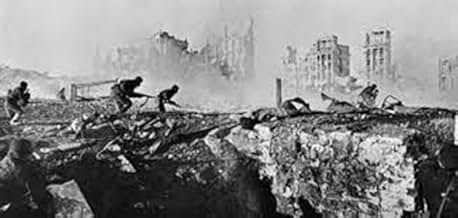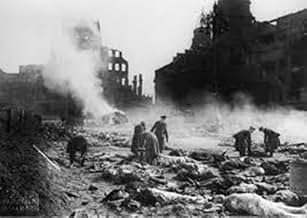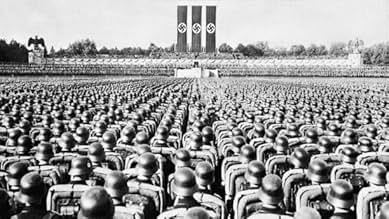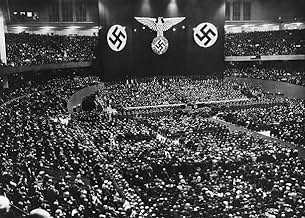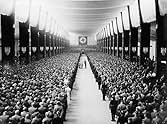Third Reich: The Rise & Fall
- Miniserie
- 2010
- 3 Std.
IMDb-BEWERTUNG
8,3/10
1257
IHRE BEWERTUNG
THE RISE and FALL erzählt die Geschichte von Hitler-Deutschland durch selten gesehene Filme von den Menschen, die dort waren. Das Endergebnis ist ein intimes, nuancenreiches und authentische... Alles lesenTHE RISE and FALL erzählt die Geschichte von Hitler-Deutschland durch selten gesehene Filme von den Menschen, die dort waren. Das Endergebnis ist ein intimes, nuancenreiches und authentisches Porträt des Dritten Reiches und seiner MenschenTHE RISE and FALL erzählt die Geschichte von Hitler-Deutschland durch selten gesehene Filme von den Menschen, die dort waren. Das Endergebnis ist ein intimes, nuancenreiches und authentisches Porträt des Dritten Reiches und seiner Menschen
- Auszeichnungen
- 2 Nominierungen insgesamt
Folgen durchsuchen
Empfohlene Bewertungen
I was going to give this a 5 but am upgrading slightly to a 6 just because of the video quality. This documentary suffers from taking itself but not the material serious enough. The edits are overdone and make the documentary seem more like a twitchy horror movie similar to the Ring rather than a good informative documentary.
Another issue I have is overuse of pauses during the speech, I assume for dramatic effect, but ends up being more like a way to draw out the documentary in a lazy way. For example, a narration would begin, quoting a victim our German citizen, then there would be a pause of about 5 seconds and I've thought they moved on, then suddenly the same person is saying something more. Often the narration repeats something that was said earlier in the same delayed fashion. I've seen some other reviewers talk about all that was left out in the first half (the rise), and they've said it better than I ever could. It makes it seem like they were just enamored with his speech and promises, which they were, but there was so much more to it. I'm glad it was covered, however briefly, how much the rest of the world seemed to like Hitler, too, because we share the blame for letting him get away with murder in his rise.
I suppose I'm also a little bitter about the title, which shares a name with probably the best nazi book ever written by shirer, and as far as detail goes they are polar opposites.
Another issue I have is overuse of pauses during the speech, I assume for dramatic effect, but ends up being more like a way to draw out the documentary in a lazy way. For example, a narration would begin, quoting a victim our German citizen, then there would be a pause of about 5 seconds and I've thought they moved on, then suddenly the same person is saying something more. Often the narration repeats something that was said earlier in the same delayed fashion. I've seen some other reviewers talk about all that was left out in the first half (the rise), and they've said it better than I ever could. It makes it seem like they were just enamored with his speech and promises, which they were, but there was so much more to it. I'm glad it was covered, however briefly, how much the rest of the world seemed to like Hitler, too, because we share the blame for letting him get away with murder in his rise.
I suppose I'm also a little bitter about the title, which shares a name with probably the best nazi book ever written by shirer, and as far as detail goes they are polar opposites.
This series was recently shown on History channel and it is a must see for any student, American citizen, teacher or human being.
It is based on actual footage from the many residents of Berlin and German villages, prior to, and then after the Third Reich and its rise and fall. It is a very human story as we see family movies, made by a German man who was later executed for not revealing his knowledge of an assassination plot against Hitler. He was, prior to that a devoted follower of the Third Reich. They also have film of the youth camps, the picturesque and lush Austrian villages (before they were decimated) and the Olympics which were staged in Berlin prior to the onslaught of Hitler's regime.
Ruth Andreas-Fridrich describes how in the late 30's she scrambled to get out of Germany before the war was initiated. One was required to leave all their assets to Germany in order to survive. The narration is very real and not melodramatic: It simply describes what it was like to have your life taken away by a regime bent on utter control and destruction.
Austrians, Polish in Warsaw (there are quite disturbing films of the Warsaw ghetto by the last American journalist who remained there). Including the eating of a dead horse, there was no food, the housing was demolished.
For those to whom war seems to be in a bubble,(especially when you view censored American corporate news today) this must be watched. The camps of Dachau, viewed in horror as the German people were at that time brought to see the reality of it. The Berlin Zoo, after it was bombed by Americans and British to stop the war. The animals and people reduced to a powdered mass.
The film is all encompassing as it shows the mass murder, and also the villagers who once believed their government. That the Third Reich would save Germany. In the end the utter destruction and alienation the German people had to return to: we see them in a futile fashion attempting to rebuild the rubble and trashed cannot be comprehended.
There were mass suicides once it was announced that Germany had lost, and its people must just "go back and rebuild it's up to them now". A very complex and important historical lesson here. Must-see. 10/10.
It is based on actual footage from the many residents of Berlin and German villages, prior to, and then after the Third Reich and its rise and fall. It is a very human story as we see family movies, made by a German man who was later executed for not revealing his knowledge of an assassination plot against Hitler. He was, prior to that a devoted follower of the Third Reich. They also have film of the youth camps, the picturesque and lush Austrian villages (before they were decimated) and the Olympics which were staged in Berlin prior to the onslaught of Hitler's regime.
Ruth Andreas-Fridrich describes how in the late 30's she scrambled to get out of Germany before the war was initiated. One was required to leave all their assets to Germany in order to survive. The narration is very real and not melodramatic: It simply describes what it was like to have your life taken away by a regime bent on utter control and destruction.
Austrians, Polish in Warsaw (there are quite disturbing films of the Warsaw ghetto by the last American journalist who remained there). Including the eating of a dead horse, there was no food, the housing was demolished.
For those to whom war seems to be in a bubble,(especially when you view censored American corporate news today) this must be watched. The camps of Dachau, viewed in horror as the German people were at that time brought to see the reality of it. The Berlin Zoo, after it was bombed by Americans and British to stop the war. The animals and people reduced to a powdered mass.
The film is all encompassing as it shows the mass murder, and also the villagers who once believed their government. That the Third Reich would save Germany. In the end the utter destruction and alienation the German people had to return to: we see them in a futile fashion attempting to rebuild the rubble and trashed cannot be comprehended.
There were mass suicides once it was announced that Germany had lost, and its people must just "go back and rebuild it's up to them now". A very complex and important historical lesson here. Must-see. 10/10.
10chez4541
This review is concerned with the second part, the fall of the Third Reich. I've seen many documentaries about the Third Reich, but none of them is even in the same league with this one, none of them conveys the tragedy, the folly and the pure inhumanity that overtook Germany and the world during that period in history. The presentation is intended to be dramatic and it has been brilliantly constructed to do that without distorting the events. The narration, the camera clips, the background score and all the other things that make up the presentation are seamlessly integrated into a chilling vision of the madness that people can inflict on each other. Some of the other reviewers have faulted the story for not including some events they thought important, but its message is larger than the Third Reich; it defines what and how so many people can lose their humanity while some can give their lives to save it.
I'm sorry but I can't accept that this is one of the best documentaries about the rise and fall of the Third Reich. Grant you, its focus on rare footage and home videos made by Germans during the era is a large plus.
Unfortunately, the first part of the story leaves so many points out that it is insulting to the Germans. I have no sympathy towards the Nazis, in fact I lost my grandfather during the occupation of Greece but the documentary is missing many points. For example there is no mention whatsoever about the fall of unemployment after Hitler took power. No mention of the support he got from the industrialists. About the massive state investments in infrastructure. About the rebuilding of the economy. It is as if the majority of Germans, at least those not persecuted, were suddenly enchanted by parades and flag waving and became supporters of the regime. There is no mention of the remilitarisation of the Rhineland one of Hitler's first diplomatic victories. There's only as brief mention of how the Annexation of Austria came to be, again as if Germans woke up one morning to find Vienna listed as a German city.
The second part(The Fall) is much more balanced and I have no serious complaints about it.
I would also prefer if the documentary was more balanced towards the victims of the Second World War. True, the Holocaust is the Nazis' largest crime against humanity. But it is extensively covered throughout the documentary while other crimes such as the brutal murdering of civilians in the USSR, in Poland and in most occupied countries or the slave labourers are mentioned for brief seconds or not at all.
Lastly, I too found the start/end fake frames of the footage overused and that some of the videos were uninteresting (toddlers walking/falling/playing). All in all not bad, but not one of the classics.
Unfortunately, the first part of the story leaves so many points out that it is insulting to the Germans. I have no sympathy towards the Nazis, in fact I lost my grandfather during the occupation of Greece but the documentary is missing many points. For example there is no mention whatsoever about the fall of unemployment after Hitler took power. No mention of the support he got from the industrialists. About the massive state investments in infrastructure. About the rebuilding of the economy. It is as if the majority of Germans, at least those not persecuted, were suddenly enchanted by parades and flag waving and became supporters of the regime. There is no mention of the remilitarisation of the Rhineland one of Hitler's first diplomatic victories. There's only as brief mention of how the Annexation of Austria came to be, again as if Germans woke up one morning to find Vienna listed as a German city.
The second part(The Fall) is much more balanced and I have no serious complaints about it.
I would also prefer if the documentary was more balanced towards the victims of the Second World War. True, the Holocaust is the Nazis' largest crime against humanity. But it is extensively covered throughout the documentary while other crimes such as the brutal murdering of civilians in the USSR, in Poland and in most occupied countries or the slave labourers are mentioned for brief seconds or not at all.
Lastly, I too found the start/end fake frames of the footage overused and that some of the videos were uninteresting (toddlers walking/falling/playing). All in all not bad, but not one of the classics.
A beautifully done documentary. Lost in the endless shuffle of World War II documentaries unfortunately. Great footage and great editing great writing and great quotations and great narrations.
I honestly think it is one of the best World War II documentaries.
2010. Apparently it is two parts, although I was only able to see the second one.
And it has a view of the war that is just a little bit different than the normal to say the least. It shows the horror of it for all sides.
A very good and honest effort to do some thing first rate.
Tony Call stands out as a very good American narrator. Although I'm sure some people would think it's over done, but I think he is fantastic.
I honestly think it is one of the best World War II documentaries.
2010. Apparently it is two parts, although I was only able to see the second one.
And it has a view of the war that is just a little bit different than the normal to say the least. It shows the horror of it for all sides.
A very good and honest effort to do some thing first rate.
Tony Call stands out as a very good American narrator. Although I'm sure some people would think it's over done, but I think he is fantastic.
Top-Auswahl
Melde dich zum Bewerten an und greife auf die Watchlist für personalisierte Empfehlungen zu.
- How many seasons does Third Reich: The Rise & Fall have?Powered by Alexa
Details
- Erscheinungsdatum
- Herkunftsland
- Sprache
- Auch bekannt als
- Третий рейх: Взлёт и падение
- Produktionsfirma
- Weitere beteiligte Unternehmen bei IMDbPro anzeigen
- Laufzeit3 Stunden
- Farbe
- Seitenverhältnis
- 1.33 : 1
Zu dieser Seite beitragen
Bearbeitung vorschlagen oder fehlenden Inhalt hinzufügen

Oberste Lücke
What is the English language plot outline for Third Reich: The Rise & Fall (2010)?
Antwort

